Insights From John Mattingly, Retired Louisville Police Sergeant Involved in the Breonna Taylor Case
Doug talks to John Mattingly, retired Louisville police sergeant involved in the Breonna Taylor case.
(MACHINE GENERATED)
Doug Truax: Welcome to the First Right podcast, a weekly conservative news show brought to you by Restoration PAC. I'm Doug Truax, founder, and president of Restoration PAC. They are blessed to have a first-time guest who has quite a story to tell he's retired Louisville police, Sergeant John Mattingly, who was involved in the Breonna Taylor shooting case like other such cases, the liberal media twisted and distorted it to fit its preferred racial narrative. John has a new book out set the record straight. Hey John, thanks for coming on the show.
John Mattingly: Good to be here, man. I appreciate you having me.
Doug Truax: Yeah. So I'd love to hear your background. Let's get up to the March, 2020 shooting and kind of stop there. And we'll obviously get into that a lot, but just give the audience a little bit about your background and what led you up to that point.
John Mattingly: All right. Well, I came on the police department in June of 2000 and it was on late watch for five years. After that, I went to what's called a flex platoon in 2005 and that's a, a division-wide narcotics unit, or if they need it for robberies or prostitution, whatever the major needs, but 95% of it was narcotics work. And then in 2009, I got promoted to Sergeant. I went back to late watch for a year. Then I went to a district detectives office for about a year and a half, 2012. I went to what's called Viper. It was a new unit. We created that attacked violent crime and criminals and went after murderers carjackers robbers that, that extended people. And then in 2016, went up to our narcotics division or major narcotics division and was there until 2020 in March when this event took place.
Doug Truax: Okay. All right. So now our March, 2020. And so now just talk us through that day. What happened? Give us, give us a snapshot or as much detail as you want. And we're obviously going to get into the media coverage and all that after the fact.
John Mattingly: All right. So our unit was requested to assist a different unit inside narcotics because it was a Superman power intensive event that night and required about 50 detectives. When we went there, it, it was roll call at 10, o'clock starting to rain outside. It was March 12th, which was a Thursday leading into Friday the 13th. It was a full moon out. Like I said, it was raining. Things just were kind of, the picture was on the wall. Different things happen. I came outside, I had two flat tires on my vehicle, had to go in and find another car to get to the scene. So things were a little bit hectic to begin with. But once we got through that night, I went by and got a visual on the apartment that we were supposed to be at. Because again, we hadn't done any of the background on this.
We were just simply there to, to assist. And I went back, told the guys that we were good to go. We went up to the door, we knocked and announced. And that's one of the big myths that you hear this, this was a no-knock warrant and it was this that couldn't be further from the truth. We knocked. It announced several times, almost a minute, banging yelling, even the upstairs neighbor came out and was like, man, what are you guys doing? And we told him to go back in his house. We explained to him later, he finally went back inside. We still got no answer to the door. So at that point, my, my boss looked at me and kind of gave the nod to go ahead and let's breach the door because we had to go in, at some point, the SWAT team was already moving down on Elliott for the main suspects in this case.
And so everything was supposed to be simultaneous. So no evidence was destroyed. So we breached the door. And as soon as that door came open from a swung from right to left and I was on the left side of it. I was able to see the living room on my right side. And as soon as I couldn't see anymore, I was forced to step into the doorway area. So I could continue to clear the apartment. As soon as I did that down a long hallway, probably 25, 30 feet away, very narrow, three foot hallway, a little bit of ambient light coming from the TV, outside from their bedroom. There were two individuals side by side almost, they were overlapping. One, another one was taller. One was shorter, but they filled the entire hallway. And as soon as my brain adjusted to what's going on here, there's two people here.
This is this isn't normal. I saw the outstretched gun from Kenneth Walker and the, the shot ring out. I was struck in my leg and returned fire. At that point, I knew I'd been severely wounded because I reached down and felt the amount of blood that was coming out of my leg. And due to all the training, we knew that most leg wounds, if, if they don't hit arteries, then they're, they're fairly, non-dangerous, you know, there's not a lot of bleeding that takes place, but I knew instantly when I felt that handful of blood, that something was wrong. So I got out of the line of fire, got myself to the parking lot, requested a tourniquet, the officers there, fortunately, one of them headed on and actually paid attention in class and got the tourniquet on me and was able to save my life.
Doug Truax: Okay. Well, first off, thanks to you for your bravery. Thank you for your service guys. Like you, we, we have to have guys like you and gals like you out there, but you know, otherwise it's, it's the thin blue line. Right? All right. So, okay. So you knew it was going to be bad. I mean, you probably were aware of media bias and things like that, you know, and you already mentioned the no-knock myth of this whole thing. So how bad was it when you started realizing, okay, the media is going to totally twist this thing. I mean, where did you have to go in your own mind from thinking that maybe, maybe the media would be like, well, they'll cover it fairly too. Oh my gosh. These guys are out of control.
John Mattingly: Right? Well, initially there wasn't a whole lot of media covers because we were right in the middle of this pandemic. You know, the governors had taken over press conferences all day, every day on TVs. The president was on every day. So it kinda got pushed to the side. And, and in my mind, I'm thinking, cause ever since Ferguson 2015, every police shooting that comes out. The first question I asked, which is asinine, but the first question that's asked is were they white or black? And again, that shouldn't matter. It should be totally, was it a good shoot, bad shoot, but unfortunately that's the state we're in. And so I knew the potential would be there, white cop black suspect that that died. And so that was always in the back of my mind, but we we'd kind of escaped it for a few weeks. And then a model robbery happened and Ben Crump jumped on that case.
And the lawyer that's involved in BR with Breonna Taylor's family had worked with Ben Crump when she was in law school. So she reached out to him and asked him to, to jump on this case, which he gladly digs. He saw dollar signs. And so when he came on instantly, it started getting national attention. Now it still wasn't to the level of the George Floyd stuff yet, but that was coming. We had the perfect triangle, the perfect storm. You know, you had Ahmuad Arbery, Breonna Taylor, and then George Floyd is really capsulated all this and pushed it into high gear. And once that took place and just all hell broke loose, not only within our city, but then our personal lives, the threats just, they were already there, but now they just came in by the, by the hundreds. I mean, we just got inundated with them. We had to, we had to move out of our house and go into hiding because the FBI received credible threats through legitimate sources in town that, that there was hits, taken out on the officer's lives. So it was a scary time.
Doug Truax: And so how long was it that intense when it really ramped up and you're moving and you're thinking, what the heck? You know, how, how long did that go on?
John Mattingly: And that went on for quite a while, probably six months, because you know, around the country, a lot of places calmed down. They had constant every day protest and Louisville for over a year. And along with that came all the misinformation. I mean, there was a laundry list of lies put out by the media, by, by the attorneys that were never combat. And to this day, not combated by our department or by our city. And so naturally when lives are being told for a year straight and nobody's refuting those laws in any, in any position of authority, then people start to think, well, there must be some truth to it or else they would stand up and defend themselves. Right. And we were hoping they would, we begged them to, and they refused to do it. I don't know their intent behind it. You know, I'm not the judge of that. I've got my, my beliefs, but the fact is we were just hung out to dry. And I just don't want to see that for future guys.
Doug Truax: Yeah. Good for you on that. And so what's that like internally, I've always thought about this piece when you feel like nobody's got your back, you know, the guys at the city, the politicians that are supposedly for law and order and protecting law, abiding citizens, basically just turn their back on you. What's that like internally with you guys on the force, the talk that starts to emerge or just, if you're willing to be Frank about it, what the, you know, willingness to do the job you used to do kind of thing, you know, how does that all play out?
John Mattingly: Well, I think you, you already see the result of, of this type of attack on law enforcement with the murder rates and the car jackings and the assaults up nationwide. I know Louisville went from, I think like 120 homicides in 19 to 170 something, 173 in 2020, then 184 and 2021. And we're on pace to, to pass 200 this year. And if you look at that per capita, that's more than two times the amount that Chicago has now, the numbers aren't there, but the per capita wise it's there. So what happens is you get these guys who are doing their job, the job they're trained to do the job, they're asked to do the job they're expected to do. They go out and do it. And then they get hung out to dry by their administration. It's like, you taught me how to do this. You paved the path. You, you asked me, you put me here. I didn't ask to go there that night. You asked for help. So I did what you asked me to do. And now you just totally abandoned me because you're afraid of the backlash that you might get from the community or for your next voting cycle.
Doug Truax: Yeah. It's pathetic. So looking back on that time, you mentioned there like a lot of different lies and things that are coming out, what are the one or two things that you're still to this day, most, you know, irritated by, in terms of what were they able to set or what was, you know, how you were hung out to dry? What, what were they saying that still bugs you the most to this day?
John Mattingly: Well, just, just on the apartment itself, there's like four things that are just, or five things that, that just constantly get repeated. The attorney said we were out drinking before this event. It's impossible. We were at two separate locations before we did this warrant that are both videotaped timestamped in and out from when we went in. So everything's documented that we weren't out drinking just another outlandish claim to throw things off. They said we had the wrong apartment, which her name, her car, her social security number, date of birth everything's on this warrant. We were where we were supposed to be. They said she was asleep in her bed when she died, not true. She was in the hallway. The, the fact that they said the boyfriend or the ex boyfriend, that was the main target DeMarcus Glover. They said he was in custody a day prior.
Now he was taken into custody at the same time, we were making entry into this house. So just a lot of those things that are still getting spread by the media, they're saying there was no drugs or money found at the apartment. True because we weren't allowed to go back in and search it. I say, we, I was in the hospital and surgery, but the guys asked, can we go back in now and serve this warrant? And they were told no by hopper command. So there was never even a chance to retrieve the evidence that they were there for. So just those lies right there that are just front page that make every single event. And most of them, most of these articles or these, these news media outlets leave out the fact that I was actually shot and almost died. It was always, there was a confrontation with the boyfriend and then they killed Brianna. Well, it's a little bit more than a confrontation. And so it's just another slap in the face.
Doug Truax: Yeah. How bout it? Little small detail there. Oh my gosh. Yeah. Thanks. Thankfully, someone knew how to tourniquet. That's good. Like you said. Yeah. So what was it like to, so did you have situations I'm assuming you did where you were, these lies were going out in the media and you're talking to your boss and he, or she's talking to their boss and on up the chain and then somewhere up there, it's just like, it flips the politics and everybody's just like, no, we're not gonna, we're just gonna, we're just going to leave you out there. I mean, I always think of like the, the police chief, right? He's like, he should be the one, right? All these politicians, all weak and everything at times, they want to do everything to please everybody they're just looking for approval all the time. You would hope that the police chief would be interested most in the truth, at least looking out for his guys. Right.
John Mattingly: Well, you got to realize police chiefs are nothing but politicians themselves.
Now they're appointed by these mayors. So these mayors put the guys in that that are like-minded to them, or at least guys they can control. And our, our chief was no different, very weak, very anything the mayor's office said or directed, there was no pushback. And so basically our department was being run by civilians who had never been police officers and everything was, was slanted to a social agenda, everything. And so they would want things cleaned up, you know, especially like Derby time's coming up. Man. Our mayor is a super progressive guy. We've got homeless camps everywhere, trash feces, you name it. It's just scattered around Louisville. Derby time comes on. It's amazing. These two weeks, when you come into Louisville, you won't see any of that. They come in with the, with the bulldozers, clean, all that stuff out. How's these guys in hotels for a few weeks by a new tense when it's over and put them back on the street.
So it's a lot of facade going on and that's government in general. But when you see it firsthand, when you're involved in it firsthand, it gives you a whole new perspective on how things really, really row. And to answer your question though. So we pushed back, we asked, we said, please put out the information, please put out the facts, because everything that's ever been put out on this case was leaked internally by people that were just fed up with the lesbian spread and nothing official has ever been put out. So when we asked that and it went up to the chain up to the chief's office and up to the mayor's office, we were told, no, we don't want to set precedent for future cases about putting information out. So my response was, so we want to let the city barn and people lose their lives and businesses destroyed because you don't want to set precedent on things that you set precedent every day. You do whatever you want. So why wouldn't you just do it on this to help people out? It made no sense.
Doug Truax: Yeah. They're just, they're just choosing temporary public opinion over the safety of their citizens. And let's backing up you guys. Yeah. It's horrible. Well, and you know, that whole concept of just them cleaning it up temporarily. I just, that is so, so disturbing that that happens. I mean, I kinda know it. Does you think of that? How that happens only in North Korea, right. When the media shows up? I do, but they do it in Townsville. And I didn't realize that what you were saying about the, I hadn't done the, looked at the numbers on that, the per capita of the murders relative to Chicago, we're outside of Chicago and I've been here for a couple of decades and it's, you know, disheartening it best at times. But yeah, if they're not going to, if, if they're, if they're always, always going to pay attention to that, but I mean, w what's the situation right now in Louisville politically? I mean, are there people, is there beginning to be a wave of discontent with this and we're going to get some people out of office here eventually, what do you think?
John Mattingly: Well, fortunately, this is our mayor's last term. It's his third term in office. And more than enough damage he's done in that 12 years, you know, the first couple of years he came in, he was a businessman, not a politician. He didn't, he actually did pretty good. And I was for him, I'm not a Democrat, but I was for him because I don't care. Who's in office, as long as you're doing the right things. And as long as you're, you're, you're there for the right reasons and helping the people. And he did that the first couple of years. So I thought, okay, I can get behind this guy, no big deal. But then something switched. And he became number one, when Obama was in office Louisville, Metro police became the flagship department for 21st century policing. We were at, we were the face of it.
And so he got tied into the politics in DC. And once that happened, he totally changed. I don't know, I don't know the ins and outs of it, but everybody could see the change in him and the way the city was run and the way our department was run. And, and once that switched, we never went back and just constantly declined to that. And we're, we're a very liberal, progressive city anyway, you know, we're, we're kind of like a small San Francisco, to be honest, it's the way we've always described it. Very eclectic, different groups, but very liberal. And so I can't see a change coming. I think they're going to elect another Democrat. I just hope it's not a Greg Fisher 2.0. Because like I said, I don't care if you got a D or an R in front of your name, as long as you're, you're doing the right thing. Yeah,
Doug Truax: Yeah. Do the job well. Absolutely. And you made a comment a second ago that I've heard, if I had a dollar for every time I heard this, it goes like this. Once Obama came in and you know, you could apply that to so many things. I'm a former army guy. And I just, you know, I want to lose my mind sometimes. So, you know, every serious study out there says that cops don't disproportionately target minority citizens. Right. You know, but what the liberal media communists in the media, they run off and do their thing. break that cycle. What's the, what's some ideas out there that you've seen to get this turned around.
John Mattingly: Well, I think it has to start in, in the elections and I'm not just talking about your mayors. You know, they'd get some, some pool, but the big issue isn't police reform. Now there's things we can always grow. If we're not constantly growing and evolving, then, then we're going to be left behind. There's going to be issues, but that's not our issue. Our issue is our, the DA's and our judges. And they're all electable. And nobody knows who these judges are. I mean, I don't know about you, but all my years of voting, I'm 49 years old. All my years of voting, I would go to the, to the booth and I would know who your Senate and Congress and mayor and governor and all that was. But when it came down to our local judges, all you see is names that you've heard in the newspaper, on the news that are familiar as you go, I guess that person's it.
And you check it, not knowing any of their background, any of the problems they've caused by the constant release of these prisoners. You saw got a day on the news. Who's a 17 year old, up in New York who had killed someone. They let him out on these murder charges and he killed somebody else. Well, that's a problem. That's not the police's fault. They'd already picked this guy up. Now. They picked him up twice and had they gotten into an altercation with him and had to kill him. He was a black guy. We would be at fault. So the problem is the system at large, not just the police, we're just a small part of it. And, and so until I think those things get fixed, we as a community and as the police are going to be tough to, to merge back, to trusting one another again,
Doug Truax: Yeah. It's going to take some time and it took a long time to get here. And you know, this is in my opinion, this is a lot of Soros money over the years, lots of millions and billions into these DA's and all these to your point, you know, it's a lot of racists. We didn't pay a lot of attention to, you know, on the conservative side. And now we've got to get more, much more serious about this. We've got a lot of ground to make up, but I think that that, that awareness is, is coming to be now. And, and so I think we're gonna, we're gonna make up that ground. So I, I hope we do relatively quickly here, something else you, you mentioned earlier, and then, you know, just the, the, the growth of crime in general and Heather McDonald has done some great studies on this in terms of just, you know, once the cops started getting assaulted and then, you know, not just like you, you go to a crime and you're in and something bad happens while you're there. It's like the crime is coming to you. You know, the assault is coming to the cops, right. Then see crime in general starts to go up, puts in disproportionately hurts a lot of times minority communities, because there's more crime even there. So speak to that for a minute in terms of like how that systemic thing is happening over time and what you saw in Louisville.
John Mattingly: Well, I think it became again, it's the whole, they wanted to defund the police and they essentially did it without, or they effectively did it without passing any bills where they raised, same way. They've raised minimum wage. They've altered speech on these platforms. They've changed the voting the way we do it. So all these things have been backdoored in and around to get us to where we're at today. And I think that's the same way with policing. I don't think there's been, you know, we are so short and Belleville just like they are across the board that you're, you're, you're spread so thin that you can't focus on the things you need to, but when you do focus on the things you need to, then you just get criticized for it. And there's an ugly side. The police work just like the, you know, you were in the military, the same thing with military. It's an ugly job. When you get down to it, when the things you have to do to make things right, and it doesn't have to be illegal or immoral, but it it's going to be ugly. Sometimes it's just the way it is. And so until that, until people can accept that and, and, and harden up a little bit, and it sounds cruel, but until we harden up a little bit as a nation and quit being so soft, I think we're going to be just in this revolving door of chaos.
Doug Truax: Yeah. That's a wonderful point. And I thought there's so many times over the years and it has, it was our parents. And even when we were younger, I'm 51. When we were younger, it was like, well, you know, we don't want to have to do this, but it has to be done sometimes. And you know, whether it was police work or stuff in the military, like you said, but now we've gotten to this place of extreme virtue, signaling, extreme touchy, feely. Everything's gotta be soft all the time. And now it becomes well, just because that bad thing happened to that criminal. There must be some other way that you guys could have done it. That would have resulted in like this really peaceful outcome.
John Mattingly: Right. This deescalation term is so overplayed. For instance, in my case, the, when I did my interview for to see if I violate any policies, the guy kept pushing on with don't you think you could have deescalated better? I'm thinking I turned a corner and got shot. What do you want? And I told him, I said, me returning fire, deescalated, the situation. Yeah,
Doug Truax: That's right. That's right.
John Mattingly: We're not gonna sit here and talk about it. This is just the way it's going to be. I'm gonna live. I'm gonna go home tonight. And, and whatever happens to you happens, but I'm going home.
Doug Truax: That's right. That's right. Yeah. In the military, just you're living in the N O W man, you just there's. No, there's no way around it. Right. And then all these guys after the fact, well, you know what I would have done. Yeah. You don't know what you would have done. All right. That's just
John Mattingly: The six months to review what you write.
Doug Truax: Exactly. Yeah, exactly. All that stuff drives me crazy. So yeah. Well, Hey, you know, I appreciate all you're doing now and the book, and we're going to promote that as well. And, and, you know, like I said, thanks for your bravery in the job. And you know, he got shot, thankfully, he didn't die. Like you said, but now you're being brave on the other side of it doing, this is a, this is a battle right here, you know? And you gotta you're, you're fighting this one too, so we really appreciate it. We definitely want to have you back on and stay in touch.
John Mattingly: Right. Well, I appreciate you having me.
Doug Truax: All right. Have a great day, John.
John Mattingly: All. Bye bye.
Doug Truax: All right. That's our show for today. Thank you so much for tuning in and for supporting conservative media. Don't forget that by working together and staying diligent, we conservatives can bring our country back to true greatness. And so next week let's all keep praying that God will continue to bless America
First, right? A new kind of new summary without the liberal slam Every morning in your inbox. Always free subscribe by texting first, right. 2, 3 0 1 6 1 that's FIRSTRIGHT All caps. One word to, 3 0 1 6, 1.
-
 19:08
19:08
The Breanna Morello Show
9 months agoCop Shot In Breonna Taylor Incident - Sgt. John Mattingly | Breanna Morello
375 -
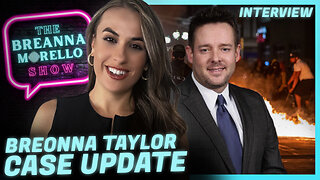 23:17
23:17
The Breanna Morello Show
7 months ago $0.13 earnedJudge Declares Mistrial in Breonna Taylor Shooting - John Mattingly
790 -
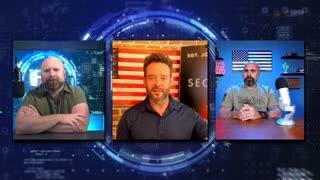 5:04
5:04
RVM News
1 year agoBreonna Taylor's Mom's Violent Motorcycle Gang: Credible Threat Against Sgt. John Mattingly's Family
3963 -
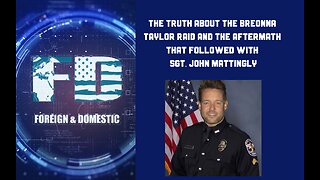 37:26
37:26
Drew Berquist
1 year agoBreonna Taylor Narrative Debunked: Sgt. John Mattingly Was There, Raid & Aftermath TRUTH Revealed
7504 -
 9:49
9:49
Last World News Channel
1 year agoDOJ issues scathing rebuke of Louisville police in report launched after Breonna Taylor killing
3 -
 1:14:56
1:14:56
Flyover Conservatives
9 months agoDOJ CORRUPTION | Internal FBI Disciplinary Records - FBI Whistleblower Steve Friend; Breonna Taylor’s Ex is on the Run - Sgt. John Mattingly; Appealing Proud Boys Sentencing - The Breanna Morello Show
24.9K4 -
 1:14:55
1:14:55
The Breanna Morello Show
9 months ago $35.36 earnedDOJ CORRUPTION | Internal FBI Disciplinary Records - FBI Whistleblower Steve Friend; Breonna Taylor’s Ex is on the Run - Sgt. John Mattingly; Appealing Proud Boys Sentencing - The Breanna Morello Show
105K86 -
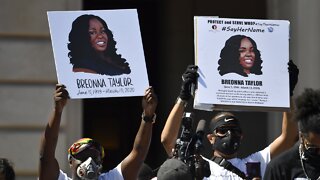 1:02
1:02
Newsy
4 years agoLouisville To Investigate Handling Of Breonna Taylor's Case
1.92K -
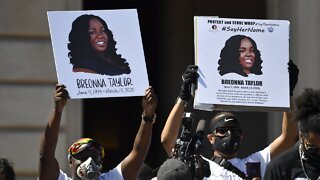 1:07
1:07
Newsy
4 years agoLouisville To Investigate Handling Of Breonna Taylor's Case
367 -
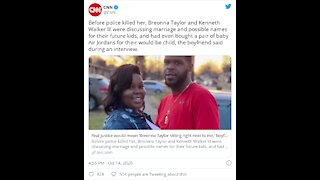 1:16
1:16
CassiusLife
3 years agoBreonna Taylor’s Boyfriend Kenneth Walker Sued By Trash Louisville Cop Jonathan Mattingly
36